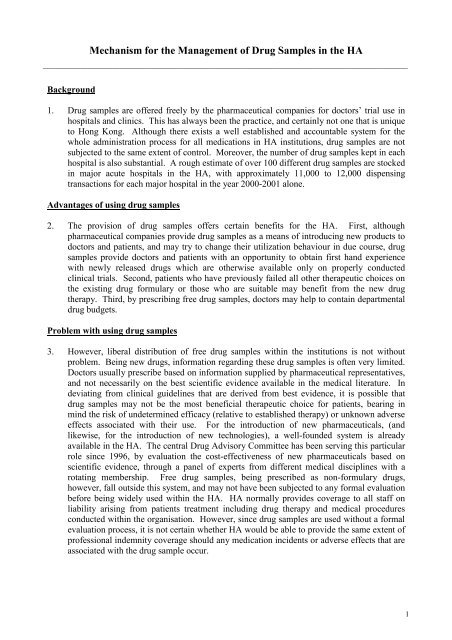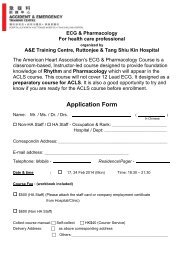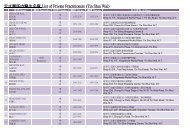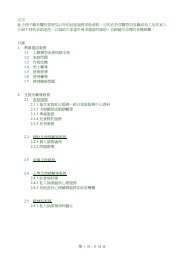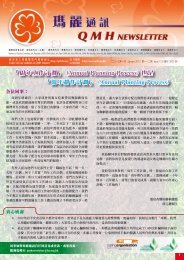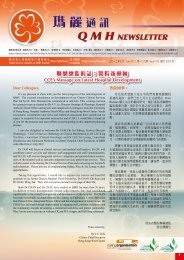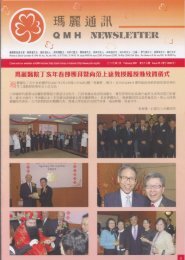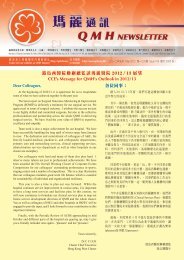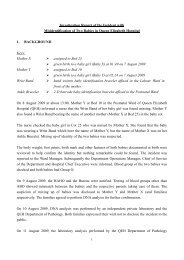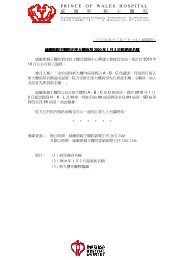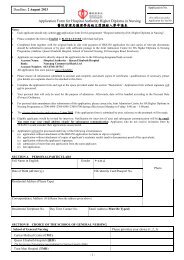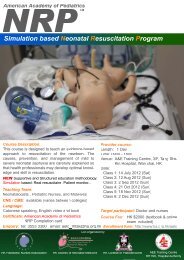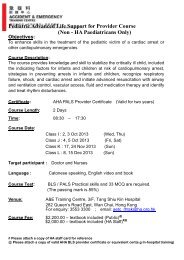2005 Edition Report on Drug Administration Procedure & Practices ...
2005 Edition Report on Drug Administration Procedure & Practices ...
2005 Edition Report on Drug Administration Procedure & Practices ...
You also want an ePaper? Increase the reach of your titles
YUMPU automatically turns print PDFs into web optimized ePapers that Google loves.
Mechanism for the Management of <strong>Drug</strong> Samples in the HA________________________________________________________________________________Background1. <strong>Drug</strong> samples are offered freely by the pharmaceutical companies for doctors’ trial use inhospitals and clinics. This has always been the practice, and certainly not <strong>on</strong>e that is uniqueto H<strong>on</strong>g K<strong>on</strong>g. Although there exists a well established and accountable system for thewhole administrati<strong>on</strong> process for all medicati<strong>on</strong>s in HA instituti<strong>on</strong>s, drug samples are notsubjected to the same extent of c<strong>on</strong>trol. Moreover, the number of drug samples kept in eachhospital is also substantial. A rough estimate of over 100 different drug samples are stockedin major acute hospitals in the HA, with approximately 11,000 to 12,000 dispensingtransacti<strong>on</strong>s for each major hospital in the year 2000-2001 al<strong>on</strong>e.Advantages of using drug samples2. The provisi<strong>on</strong> of drug samples offers certain benefits for the HA. First, althoughpharmaceutical companies provide drug samples as a means of introducing new products todoctors and patients, and may try to change their utilizati<strong>on</strong> behaviour in due course, drugsamples provide doctors and patients with an opportunity to obtain first hand experiencewith newly released drugs which are otherwise available <strong>on</strong>ly <strong>on</strong> properly c<strong>on</strong>ductedclinical trials. Sec<strong>on</strong>d, patients who have previously failed all other therapeutic choices <strong>on</strong>the existing drug formulary or those who are suitable may benefit from the new drugtherapy. Third, by prescribing free drug samples, doctors may help to c<strong>on</strong>tain departmentaldrug budgets.Problem with using drug samples3. However, liberal distributi<strong>on</strong> of free drug samples within the instituti<strong>on</strong>s is not withoutproblem. Being new drugs, informati<strong>on</strong> regarding these drug samples is often very limited.Doctors usually prescribe based <strong>on</strong> informati<strong>on</strong> supplied by pharmaceutical representatives,and not necessarily <strong>on</strong> the best scientific evidence available in the medical literature. Indeviating from clinical guidelines that are derived from best evidence, it is possible thatdrug samples may not be the most beneficial therapeutic choice for patients, bearing inmind the risk of undetermined efficacy (relative to established therapy) or unknown adverseeffects associated with their use. For the introducti<strong>on</strong> of new pharmaceuticals, (andlikewise, for the introducti<strong>on</strong> of new technologies), a well-founded system is alreadyavailable in the HA. The central <strong>Drug</strong> Advisory Committee has been serving this particularrole since 1996, by evaluati<strong>on</strong> the cost-effectiveness of new pharmaceuticals based <strong>on</strong>scientific evidence, through a panel of experts from different medical disciplines with arotating membership. Free drug samples, being prescribed as n<strong>on</strong>-formulary drugs,however, fall outside this system, and may not have been subjected to any formal evaluati<strong>on</strong>before being widely used within the HA. HA normally provides coverage to all staff <strong>on</strong>liability arising from patients treatment including drug therapy and medical proceduresc<strong>on</strong>ducted within the organisati<strong>on</strong>. However, since drug samples are used without a formalevaluati<strong>on</strong> process, it is not certain whether HA would be able to provide the same extent ofprofessi<strong>on</strong>al indemnity coverage should any medicati<strong>on</strong> incidents or adverse effects that areassociated with the drug sample occur.1


